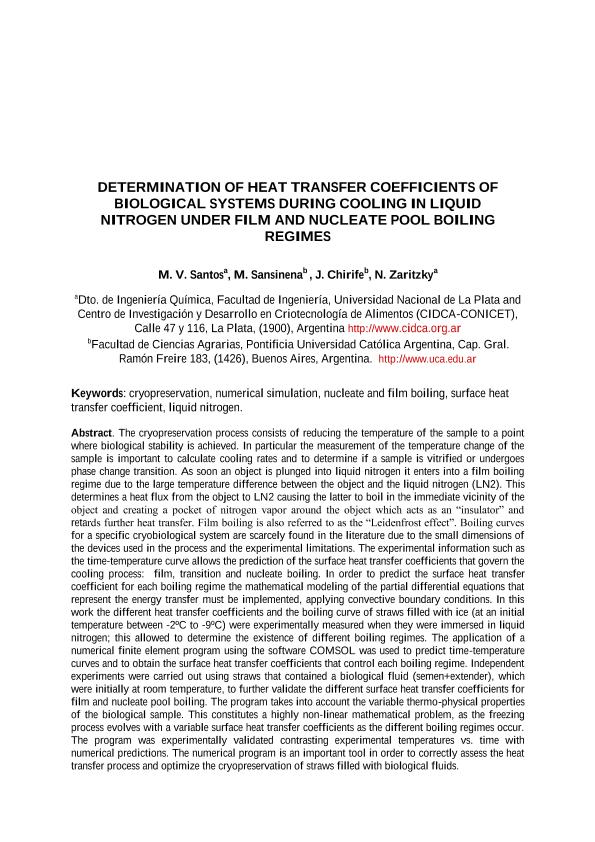Mostrar el registro sencillo del ítem
dc.contributor.author
Santos, Maria Victoria

dc.contributor.author
Sansinena, Marina Julia

dc.contributor.author
Chirife, Jorge

dc.contributor.author
Zaritzky, Noemi Elisabet

dc.date.available
2017-01-04T17:52:08Z
dc.date.issued
2014-09
dc.identifier.citation
Santos, Maria Victoria; Sansinena, Marina Julia; Chirife, Jorge; Zaritzky, Noemi Elisabet; Determination of heat transfer coefficients of biological systems during cooling in liquid nitrogen under film and nucleate pool boiling regimes; Asociación Argentina de Mecánica Computacional; Mecanica Computacional; XXXIII; 42; 9-2014; 2759-2771
dc.identifier.issn
1666-6070
dc.identifier.uri
http://hdl.handle.net/11336/10819
dc.description.abstract
The cryopreservation process consists of reducing the temperature of the sample to a point where biological stability is achieved. In particular the measurement of the temperature change of the sample is important to calculate cooling rates and to determine if a sample is vitrified or undergoes phase change transition. As soon an object is plunged into liquid nitrogen it enters into a film boiling regime due to the large temperature difference between the object and the liquid nitrogen (LN2). This determines a heat flux from the object to LN2 causing the latter to boil in the immediate vicinity of the object and creating a pocket of nitrogen vapor around the object which acts as an “insulator” and retards further heat transfer. Film boiling is also referred to as the “Leidenfrost effect”. Boiling curves for a specific cryobiological system are scarcely found in the literature due to the small dimensions of the devices used in the process and the experimental limitations. The experimental information such as the time-temperature curve allows the prediction of the surface heat transfer coefficients that govern the cooling process: film, transition and nucleate boiling. In order to predict the surface heat transfer coefficient for each boiling regime the mathematical modeling of the partial differential equations that represent the energy transfer must be implemented, applying convective boundary conditions. In this work the different heat transfer coefficients and the boiling curve of straws filled with ice (at an initial temperature between -2ºC to -9ºC) were experimentally measured when they were immersed in liquid nitrogen; this allowed to determine the existence of different boiling regimes. The application of a numerical finite element program using the software COMSOL was used to predict time-temperature curves and to obtain the surface heat transfer coefficients that control each boiling regime. Independent experiments were carried out using straws that contained a biological fluid (semen+extender), which were initially at room temperature, to further validate the different surface heat transfer coefficients for film and nucleate pool boiling. The program takes into account the variable thermo-physical properties of the biological sample. This constitutes a highly non-linear mathematical problem, as the freezing process evolves with a variable surface heat transfer coefficients as the different boiling regimes occur. The program was experimentally validated contrasting experimental temperatures vs. time with numerical predictions. The numerical program is an important tool in order to correctly assess the heat transfer process and optimize the cryopreservation of straws filled with biological fluids.
dc.format
application/pdf
dc.language.iso
eng
dc.publisher
Asociación Argentina de Mecánica Computacional
dc.rights
info:eu-repo/semantics/openAccess
dc.rights.uri
https://creativecommons.org/licenses/by-nc-sa/2.5/ar/
dc.subject
Cryopreservation
dc.subject
Numerical Simulation
dc.subject
Nucleate And Film Boiling
dc.subject
Surface Heat Transfer Coefficient
dc.subject
Liquid Nitrogen
dc.subject.classification
Ciencias de la Computación

dc.subject.classification
Ciencias de la Computación e Información

dc.subject.classification
CIENCIAS NATURALES Y EXACTAS

dc.subject.classification
Otras Ingeniería Química

dc.subject.classification
Ingeniería Química

dc.subject.classification
INGENIERÍAS Y TECNOLOGÍAS

dc.subject.classification
Otras Biotecnología Agropecuaria

dc.subject.classification
Biotecnología Agropecuaria

dc.subject.classification
CIENCIAS AGRÍCOLAS

dc.title
Determination of heat transfer coefficients of biological systems during cooling in liquid nitrogen under film and nucleate pool boiling regimes
dc.type
info:eu-repo/semantics/article
dc.type
info:ar-repo/semantics/artículo
dc.type
info:eu-repo/semantics/publishedVersion
dc.date.updated
2016-12-12T14:11:53Z
dc.journal.volume
XXXIII
dc.journal.number
42
dc.journal.pagination
2759-2771
dc.journal.pais
Argentina

dc.journal.ciudad
San Carlos de Bariloche
dc.description.fil
Fil: Santos, Maria Victoria. Provincia de Buenos Aires. Gobernación. Comisión de Investigaciones Científicas. Centro de Investigación y Desarrollo en Criotecnología de Alimentos. Consejo Nacional de Investigaciones Científicas y Técnicas. Centro Científico Tecnológico Conicet - La Plata. Centro de Investigación y Desarrollo en Criotecnología de Alimentos. Universidad Nacional de la Plata. Facultad de Ciencias Exactas. Centro de Investigación y Desarrollo en Criotecnología de Alimentos; Argentina
dc.description.fil
Fil: Sansinena, Marina Julia. Pontificia Universidad Catolica Argentina "Santa Maria de Los Buenos Aires". Facultad de Ciencias Agrarias; Argentina
dc.description.fil
Fil: Chirife, Jorge. Pontificia Universidad Catolica Argentina "Santa Maria de Los Buenos Aires". Facultad de Ciencias Agrarias; Argentina
dc.description.fil
Fil: Zaritzky, Noemi Elisabet. Provincia de Buenos Aires. Gobernación. Comisión de Investigaciones Científicas. Centro de Investigación y Desarrollo en Criotecnología de Alimentos. Consejo Nacional de Investigaciones Científicas y Técnicas. Centro Científico Tecnológico Conicet - La Plata. Centro de Investigación y Desarrollo en Criotecnología de Alimentos. Universidad Nacional de la Plata. Facultad de Ciencias Exactas. Centro de Investigación y Desarrollo en Criotecnología de Alimentos; Argentina
dc.journal.title
Mecanica Computacional

dc.relation.alternativeid
info:eu-repo/semantics/altIdentifier/url/http://www.cimec.org.ar/ojs/index.php/mc/article/view/4867
Archivos asociados
